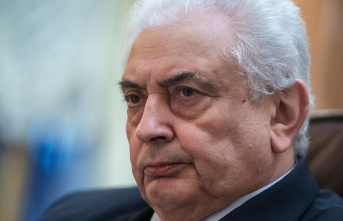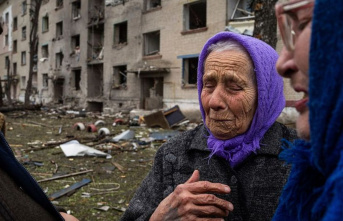The Falkland Islands are more than 12,000 kilometers away from Great Britain - and only around 500 kilometers from Argentina. Nevertheless, the islands belong to the United Kingdom; since 1833 they have been under British administration. This has been a thorn in the side of Argentines - who call the islands Malvinas - for around two centuries.
Tensions between London and Buenos Aires over the Falkland Islands are now threatening to rise again: Argentina has canceled the so-called Foradori-Duncan Pact of 2016. Foreign Minister Santiago Cafiero said his government wants to resume negotiations over the sovereignty of the Falkland Islands.
The pact had regulated questions about the production of gas and oil as well as shipping and fishing in the waters around the Falkland Islands. Argentina's current government believes that the previous government made too many concessions in the London negotiations.
The Falkland Islands are still very important to Argentina today. Argentina states that they own the Malvinas because they inherited them from the Spanish Crown in the 19th century and because they are close to the Argentine coast. In the eyes of many Argentines, the Malvinas are their territory - not that of the British.
"In the 21st century, the English have to be ashamed of having a colony," Argentina's President Alberto Fernandez said in an interview with Britain's BBC. "It's disgusting to think that, disgusting. It's stolen land."
Great Britain sees it differently. The UK bases its claims on long-standing administration of the islands and the islanders' right to self-determination, who voted overwhelmingly to remain in Britain in 2013.
The differences between the two states reached a climax in 1982 when war broke out between Great Britain and Argentina: the Argentines occupied the islands. According to historians, the then military junta wanted to distract attention from domestic political problems. British Prime Minister Margaret Thatcher ordered the reconquest, which succeeded after 72 days of war. 649 Argentines, 255 Britons and three residents lost their lives. The lost war is still an open wound for Argentina today.
Although Argentina has offered Britain diplomatic talks over the islands, London is unwilling to hear about it. Foreign Minister James Cleverly responded to the announcement by his Argentine counterpart on Twitter: "The Falkland Islands are British."
"The islanders have the right to choose their own future - they have chosen to remain a self-governing British Overseas Territory."
Cleverly is addressing the referendum on the Falkland Islands: On March 10th and 11th, 2013, 99.8 percent of the residents voted in favor of the status quo - i.e. for remaining under the British flag.
On the tenth anniversary of the referendum, the result was reaffirmed and Argentinean claims vehemently rejected. "The people of the Falkland Islands - like people around the world - have the right to determine their own future," said the government of the British Overseas Territory in the South Atlantic. "But in the Falkland Islands, it doesn't always feel like our right to self-determination is a given." Despite the democratic decision, the freedom to live under a self-elected government continues to be questioned.
Buenos Aires called the result of the vote "irrelevant". "Without UN endorsement and recognition, a so-called 'referendum' has no legal value under international law," Argentina's Foreign Ministry Secretary Guillermo Carmona tweeted on Friday. "It's been ten years and they haven't gained recognition."
Does the cancellation of the Foradori-Duncan Pact threaten to flare up in the Falklands conflict – perhaps even a military conflict?
The latter is rather unlikely. The 1982 war is largely seen as a mistake in Argentina today. In addition, Great Britain significantly increased its military presence on the islands after the Falklands War, there is a military airfield in Mount Pleasant.
Area in km²: 12,173
Population: 3539
Capital: Stanley
Heads of Government: Governor Nigel Phillips, Administrator Andy Keeling
Source: The New Cosmos World Almanac
Argentina's step may also have domestic political reasons: in October there will be elections in the South American country and the Malvinas are a popular campaign topic. Argentina repeatedly addresses the issue before the United Nations and reiterates its claim to the islands.
Withdrawing from the Foradori-Duncan Pact has upset the already difficult relations between London and Buenos Aires. Argentina has now invited the British to diplomatic talks at the United Nations. Whether Great Britain accepts this invitation is still open.
But one thing is certain: If both countries continue to insist on their positions, there should be no rapprochement. Diplomatic relations are likely to suffer as a result.
Sources: DPA, AP and Reuters news agencies, Deutsche Welle, BBC, SRF











